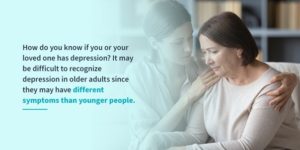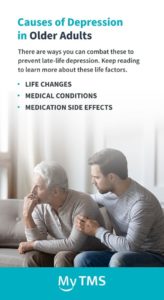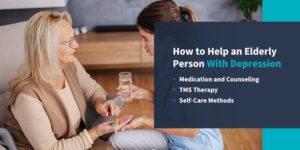
Older adults are often portrayed as living their retirement years happily, filling their days traveling and spending time with grandchildren. However, life can lose excitement for an older adult living with depression.
An older adult might develop depression for several reasons, ranging from isolation to illness. Whatever the case, if you or someone you love is experiencing depression in the later years of life, it’s essential to find help. Learn how to identify depression in older people and the many chronic depression treatment options available.
Depression and Older Adults
Depression is a mood disorder that can affect how you feel, act and think. Depression is not an age-related disease, though an older adult’s health can increase the likelihood that they experience it. The U.S. Centers for Disease Control and Prevention (CDC) states that the risk of late-life depression is high among older adults with an illness or limited function. Health issues are common as we age and can increase the risk of major depressive disorder.
Chronic and debilitating health conditions that impair brain function or limit mobility can cause discomfort that may lead to late-light depression. The CDC estimates that 80% of older adults live with at least one chronic health issue, making depression more of a reality. Depression rates are also higher among those whose medical conditions require hospitalization or home health care.
Other risk factors include:
- A history of depression earlier in life.
- Medication that alters moods, such as painkillers or sleeping pills.
- Seasonal affective disorder (SAD), which occurs in the winter months when sunlight is low.
- Sleep problems.
- Family history of depression.
- Lack of exercise or physical activity.
- Substance misuse.
- Loneliness among older adults living in isolation or who have lost peers in their social network.
In the same way that older adults would seek treatment for a condition like heart disease, hearing loss, osteoporosis or arthritis, they should also seek chronic depression treatment options. Therapy and other forms of treatment can help manage and combat major depressive disorder among older adults.

Signs of Depression in the Elderly
How do you know if you or your loved one has depression? It may be difficult to recognize depression in older adults since they may have different symptoms than younger people. While sadness and despair are the main symptoms of depression, this is not always the case for older adults. They may instead feel numb or disinterested in activities and social interaction. They may also be less willing to discuss their feelings.
The following are common signs of depression among older adults:
- Persistent sad or anxious mood
- Feelings of hopelessness, worthlessness or guilt
- Irritability or restlessness
- Memory problems
- Unexplained or aggravated aches and pains
- Lack of motivation and energy
- Increased use of alcohol or other drugs
- Decreased energy or fatigue
- Moving or talking more slowly than usual
- Loss of interest in once enjoyed activities and hobbies
- Difficulty concentrating or making decisions
- Difficulty sleeping or oversleeping
- Waking up earlier in the morning than usual
- Eating more or less than usual, resulting in weight gain or loss
- Neglecting personal care, such as forgetting to take medicine, skipping meals or neglecting personal hygiene
- Thoughts of death or suicide
- Suicide attempts
It’s important to note that depression feels different from person to person, so the symptoms may vary. If you or a loved one has these signs or symptoms and they last longer than two weeks, it’s essential to talk to a doctor. They may be a sign of depression or another health problem. It’s vital not to ignore these warning seasons. If left untreated, depression can lead to suicide.
If you have a loved one displaying symptoms of depression or suicidal thoughts, listen carefully to them. That person may be calling out for help. Knowing the warning signs of late-life depression can help save lives.

Causes of Depression in Older Adults
As we grow older, it’s common for several life changes or medical conditions to arise that may impact our mental health. However, there are ways you can combat these to prevent late-life depression. Keep reading to learn more about these life factors.
Life Changes
As we age, several life changes can increase our risk of depression. Common causes of depression in older adults include:
- Health problems: Illness, chronic pain or disability, cognitive decline or surgeries and sickness can all contribute to depression.
- Loneliness and isolation: Factors such as living alone, a dwindling social circle due to relocation or death, limited mobility due to illness or loss of driving privileges can cause depression.
- A diminished sense of purpose: Retirement can bring with it a loss of status, identity, self-confidence and financial security. At the same time, these factors can increase a person’s risk of depression. An inability to enjoy previously enjoyed activities due to physical limitations can also affect your sense of purpose.
- Anxiety or existential fears: Anxieties might surround a fear of dying or death as well as financial problems, health issues, abuse, neglect and other fears.
- Recent bereavements: The death of family members, friends, pets or the loss of a partner are common reasons for depression in older adults. While these losses are painful and grieving is only natural, grief can quickly turn into depression when the sadness is constant.
Medical Conditions
In addition to the above factors, several medical conditions can also lead to depression among older adults, either directly or as a psychological reaction to the illness itself.
These conditions include:
- Parkinson’s disease
- Heart disease
- Lupus
- Cancer
- Stroke
- Dementia and Alzheimer’s disease
- Diabetes
- Thyroid disorders
- Vitamin B12 deficiency
- Multiple sclerosis (MS)
Any chronic medical condition, especially one that is disabling, painful or life-threatening, can cause depression or exacerbate symptoms.
Medication Side Effects
Certain medicines can cause side effects that mimic symptoms of depression. You’re especially at risk if you take multiple medications. While the mood-related side effects of these medicines can affect people of all ages, older adults are more susceptible since our bodies become less efficient at processing and metabolizing drugs as we age.
Medications that may lead to depression or worsen symptoms include:
- Heart drugs containing reserpine.
- Blood pressure medication, like clonidine.
- Painkillers and arthritis drugs.
- Beta-blockers, such as Lopressor or Inderal.
- Medicines for Parkinson’s disease.
- Tranquilizers like Valium, Xanax or Halcion.
- Calcium-channel blockers.
- Anticholinergic medications used to treat GI disorders.
- Steroids, or cortisone and prednisone.
- Sleeping pills.
- High-cholesterol drugs like Lipitor, Mevacor or Zocor.
- Ulcer medication such as Zantac and Tagamet.
- Estrogens like Premarin and Prempro.
If you suspect you may be depressed after starting a new medication, it’s essential to speak with your doctor. They may lower the dose or switch you to a new medication that won’t affect your mood.
Is Depression in Older Adults Treatable?
Late-life depression is a serious illness, though older adults do not need to suffer. For most people, depression gets better with professional treatment, from medicines to counseling. Self-care methods like exercise, proper sleep, diet and social enrichment can also help manage depressive symptoms.
A medical professional can teach you how to get elderly people out of depression so you can help your loved one feel better.

How to Help an Elderly Person With Depression
While depression can present several struggles, it can also hinder our ability to seek help. For depressed older adults raised in a time when mental illness was often misunderstood and stigmatized, it can be even more difficult. Older adults might believe depression isn’t an actual illness or refuse to ask for help for fear of burdening their families.
If your loved one is depressed, you can make a difference by offering your emotional support. Listening to them with compassion and patience can often be enough. Resist attempting to “fix” their depression or criticize their feelings, but offer your empathy and hope. You might also encourage your loved one to get an accurate diagnosis and proper treatment. By helping them find a good doctor, accompanying them to appointments and offering moral support, you can help an older adult with depression.
Addressing late-life depression directly can relieve the problems with aging that some people experience. It can also promote better physical and mental health since depression can often lead to physical and cognitive deterioration. If an older adult in your life shows signs of depression, seeing a doctor early can help rule out any potential medical causes. And if they receive a depression diagnosis, you can help them get a treatment plan in place.
Medication and Counseling
A combination of psychotherapy and medications has been shown to be effective for older adults. However, not all types of therapies and medications are appropriate for everyone. Treatment methods differ from person to person, and many require trying multiple types to find one that works.
It’s also important to note that older adults are sensitive to drug side effects and particularly vulnerable to medication interactions. Some antidepressants, such as selective serotonin reuptake inhibitors (SSRIs), can cause rapid bone loss and a higher risk for falls and fractures. Due to these safety concerns, older adults on antidepressants often require careful monitoring.
Since depression in older adults is often compounded or triggered by difficult life situations, treatment plans should address that too. Medication might help some, though psychotherapy can often get to the root of the issue to help overcome your depression, rather than simply treating the symptoms. If loneliness and isolation are at the root of your depression, for instance, medication alone cannot cure the problem.
Psychotherapy or “talk therapy” may help a person identify and change their troubling emotions, thoughts and behavior. A psychologist, psychiatrist or other licensed mental health care professional can help directly address depression and symptoms through cognitive-behavioral therapy (CBT) or interpersonal therapy (IPT). These therapeutical methods can help older adults heal from losses, process challenging emotions and get through stressful life changes. CBT can help you identify and change negative thought patterns while developing healthy coping skills.
Support groups can also help ease loneliness and hopelessness of depression. Group settings for depression or illness and bereavement can connect you with others with similar challenges and provide a safe space to share advice, experiences and encouragement.
TMS Therapy
Transcranial magnetic stimulation (TMS) is another drug-free, non-sedative treatment option that uses magnets to activate regions of the brain associated with depression. While medicines can often take weeks to work and present complications, TMS therapy is noninvasive, safe and effective for treating depression and its symptoms.
After just a few sessions, many people report reduced depression and a better overall quality of life. That’s what makes TMS so helpful for older adults with depression. Studies show that 50% to 60% of people with depression who do not benefit from medications experience reduced symptoms from TMS, while one-third experience complete remission and symptoms go away completely.
TMS Therapy presents less impact and risk on older adults’ mental and physical health.
Self-Care Methods
Healthy lifestyle changes like yoga, meditation and proper diet and exercise can help relieve depression without the uncomfortable side effects of antidepressants.
These complementary health approaches may improve well-being and help older adults cope with stress. While these methods can be used in combination with other treatments prescribed by a doctor, they should not be a replacement for professional treatment.
Examples of additional treatment options or self-care for depression include:
- Mindfulness meditation: A 2019 study found that older adults saw an improvement in depression symptoms, sleep quality and pain severity after following a mindful meditation regimen for six weeks. Mindfulness meditation involves calming the mind and body through mental training practices. This technique teaches you to slow racing thoughts and negativity to help improve anxiety and depression. Experts believe that focusing on the present lets you accept your thoughts, feelings and sensations without judgment.
- Yoga: A 2019 study noted that yoga might improve mental health in older adults. Attending regular yoga classes can also help older adults improve their physical health and connect with others. Through various physical postures and breathing techniques, people of all ages can appreciate yoga’s ability to calm the mind and body.
- Exercise and physical activity: Experts note that exercise can prevent and help manage symptoms of depression among older adults. Practicing endurance activities, such as brisk walking or swimming, long-term can help adults, even if it’s just a few times a week. These exercises can also increase breathing and heart rate to prevent physical ailments.
- Social activities: It’s essential to stay in touch with friends and family to prevent or manage depression. Older adults can also attend community events, join a club or volunteer to gain a sense of purpose in their daily life and connect with others to reduce loneliness. Any activity that provides mental or physical stimulation can help older adults stay active and reduce their risk of depression.
- Healthy diet: Eating a healthy, balanced diet can help avoid illnesses that bring depression or disability. A poor diet can make depression worse, though a low-sodium diet rich in fruits, vegetables, fiber and whole grains can reduce the risk of depression in older adults.

Contact My TMS Therapy for Depression Relief
While depression can happen to anyone as they age, there are ways to boost how you feel and live your golden years healthy and happy. TMS therapy can be a highly effective treatment for older adults with depression.
My TMS Therapy provides TMS and premier mental health services to help combat depression and improve your quality of life. Our team of psychiatric professionals are leaders in the field and can safely administer TMS therapy to help you feel better.
To schedule an appointment, we invite you to contact us today.

